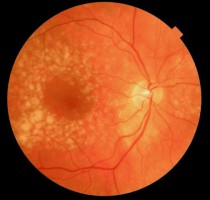
Macular Degeneration
Age-related macular degeneration (AMD) is a painless eye condition that causes you to lose central vision, usually in both eyes.
Central vision is what you see when you focus straight ahead. In AMD, this vision becomes increasingly blurred, which means:
- reading becomes difficult
- colours appear less vibrant
- people's faces are difficult to recognise
This sight loss usually happens gradually over time, although it can sometimes be rapid.
AMD doesn't affect your peripheral vision (side vision), which means it will not cause complete blindness.
When to seek medical advice
Visit your GP or optician if your vision is getting gradually worse. If your vision suddenly gets worse, images are distorted or you notice blind spots in your field of vision, seek medical advice immediately and book an emergency appointment with an optometrist.
If AMD is suspected, you'll be referred to an ophthalmologist (eye specialist) for tests and any necessary treatment.
Why it happens
Macular degeneration develops when the part of the eye responsible for central vision (the macula) is unable to function as effectively as it used to. There are two main types – dry AMD and wet AMD.
Dry AMD
Dry AMD develops when the cells of the macula become damaged by a build-up of deposits called drusen. It's the most common type of AMD, accounting for around 9 out of 10 cases.
Vision loss is gradual, occurring over many years. However, an estimated 1 in 10 people with dry AMD go on to develop wet AMD.
Wet AMD
Wet AMD – sometimes called neovascular AMD – develops when abnormal blood vessels form underneath the macula and damage its cells.
Wet AMD is more serious than dry AMD. Without treatment, vision can deteriorate within days.
Who's affected?
AMD currently affects more than 600,000 people in the UK and is the leading cause of vision loss. By 2020, it's predicted almost 700,000 people will have late-stage AMD in the UK.
For reasons that are unclear, AMD tends to be more common in women than men. It's also more common in white and Chinese people.
The condition is most common in people over the age of 50. It's estimated 1 in every 10 people over 65 have some degree of AMD.
Treating macular degeneration
There's currently no cure for either type of AMD. With dry AMD, treatment aims to help a person make the most of their remaining vision – for example, magnifying lenses can be used to make reading easier.
There's some evidence to suggest a diet rich in leafy green vegetables may slow the progression of dry AMD.
Wet AMD can be treated with anti-vascular endothelial growth factor (anti-VEGF) medication. This aims to stop your vision getting worse by preventing further blood vessels developing. The medication is injected into the back of the eye by the eye surgeon.
In some cases, laser surgery can also be used to destroy abnormal blood vessels.
The early diagnosis and treatment of wet AMD is essential for reducing the risk of severe vision loss.
Reducing your risk
It's not always possible to prevent macular degeneration because it's not clear exactly what triggers the processes that cause the condition.
Your risk of developing AMD is closely linked to your age and whether you have a family history of the condition.
However, you may be able to reduce your risk of developing AMD, or help prevent it getting worse, by:
- stopping if you smoke
- eating a healthy, balanced diet that includes plenty of fruit and vegetables
- moderating your consumption of alcohol
- trying to achieve or maintain a healthy weight
- wearing UV-absorbing glasses when outside for long periods
Juvenile macular degeneration
In rare cases, macular degeneration can affect younger people. This is sometimes known as juvenile macular degeneration.
It can be present at birth or develop later, but it's almost always caused by an inherited genetic disorder, such as:
- Stargardt's disease – the most common cause of juvenile macular degeneration, this can start in childhood or early adulthood
- Best's disease – also known as Best's vitelliform macular dystrophy
- Sorsby's dystrophy – this often begins between the ages of 30 and 40
